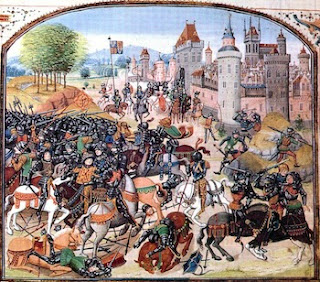To that end, there were over the years what are called the wars of Scottish Independence. They were successful in that Scotland managed to maintain its independence from England. During the Second War of Scottish Independence, which took place between the years 1332 and 1357, one of the battles was fought at Neville's Cross, right next to Durham England.
The catalyst for this particular battle was not any particular incident of aggression between the countries. Scotland had made a treaty with France in 1295 called "the Auld Alliance" against their common antagonist, England. France was fighting England in the Hundred Years War, and called on Scotland to help based on the treaty. England was currently invading France, and Scotland's attack could either weaken England for a later counter-invasion by France or cause England to pull troops away from France.
As it turns out, it did neither. Scotland's army of 10-12,000 was led by King David II. They were met by Ralph, Lord Neville with about 6-7000 men. The Scots were soundly defeated and David captured. His ransoming effort also created a truce between the two countries that lasted four decades.
How did the superior numbers lose the battle? France convinced the Scots that they would have an easy time of it with the English army on the continent, but the English had plenty of soldiers at home who were more experienced. The Scottish army had a few noblemen on horseback, but the majority were on foot and had swords and daggers and shields. They had a few archers. The English had more archers with longbows and rained arrows on the Scots until the fighting got closer, and more plate armor.
Before being stopped at Neville's Cross (so-called because of an Anglo-Saxon stone cross at the location), the Scots did do damage to the countryside. They destroyed a castle called the Peel of Liddell and plundered the Great Priory of Hexham. They would have sacked Carlisle, but the city offered them money to leave them alone.
During the battle, King David had dismounted to fight on foot. At one point he decided to hide. I want to talk about his discovery, capture, and ransom next. See you tomorrow.

No comments:
Post a Comment
Note: Only a member of this blog may post a comment.